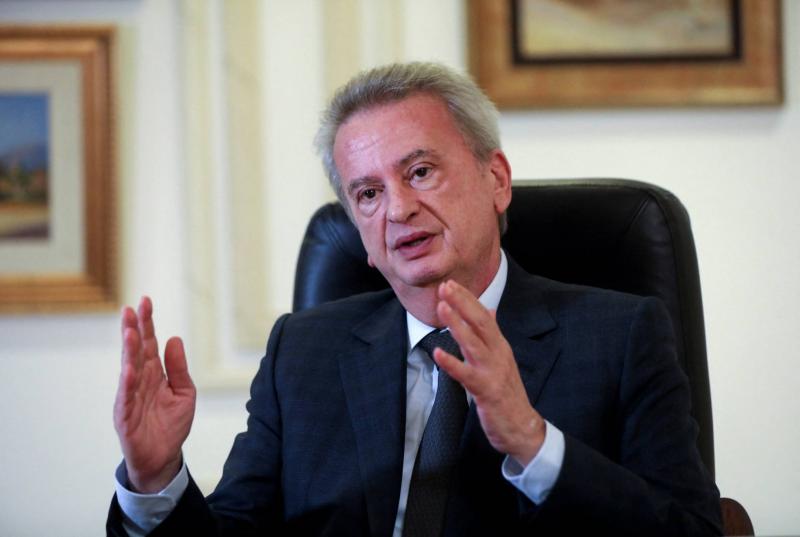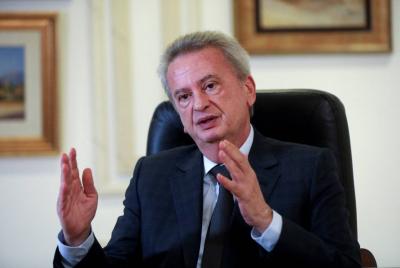Germany has verbally informed Lebanon of the issuance of an arrest warrant for the Governor of the Central Bank of Lebanon, Riad Salameh, who is under investigation for allegations of money laundering and embezzlement both domestically and abroad, which he denies. This step comes just one week after France issued an arrest warrant for the 72-year-old Salameh, and only days after Interpol released a red notice placing him on the wanted list. There are reports of a French decision made in early July regarding the legality of seizing the assets of the Governor of the Central Bank of Lebanon.
Here’s an overview of what you need to know about the cases:
*European Investigations*
The investigations began with a Swiss audit into whether Salameh and his brother Raja embezzled over $300 million from the Central Bank of Lebanon between 2002 and 2015. Since then, several European countries, including France, Germany, Luxembourg, and Liechtenstein, have begun their own investigations into whether tens of millions of dollars allegedly embezzled from the Central Bank were laundered in Europe. In March 2022, the European Union's judicial cooperation agency announced the freezing of approximately €120 million ($130 million) of Lebanese assets in France, Germany, Luxembourg, Monaco, and Belgium in connection with a case that Munich prosecutors have indicated Salameh is suspected of being involved in. European investigators have traveled to Lebanon three times: the first in January to question witnesses and gather additional evidence, the second in March to interrogate Salameh, and the third in May to interrogate his brother Raja and aide Marian Hweik. France issued an arrest warrant on May 16 after Salameh missed a hearing in Paris, and he stated that he would appeal the warrant. Interpol issued the red notice for Salameh in the same week. France also summoned Raja and Marian Hweik for hearings on May 31 and June 13, respectively.
*Stalled Lebanese Investigation*
Lebanese authorities announced that they had opened their own investigation following a request for judicial cooperation from Switzerland. Critics are skeptical about whether the Lebanese judiciary, which relies heavily on political support for appointments, will seriously investigate allegations related to a figure of Salameh's stature, given the political backing he receives from senior officials. The judiciary acknowledges the difficulties. The highest judge in Lebanon noted in a public statement in November 2022 that political interference in the judiciary has led to a chaotic situation that requires a "revolution in approaches" to resolve. Reports indicate that Judge Jean Tannous, appointed to lead the preliminary investigation, faced obstacles, including interference from caretaker Prime Minister Najib Mikati to prevent him from accessing bank data. Mikati denied these reports. Reuters reported that the Attorney General, Ghassan Oueidat, prevented Tannous from attending a meeting in Paris last year with European prosecutors investigating Salameh. In June 2022, Oueidat ordered a prosecutor to file official charges against Salameh, but the prosecutor refused and sought to recuse himself from the case before being obstructed by legal challenges from the governor. In February, Salameh, his brother Raja, and aide Marian Hweik were charged with money laundering, embezzlement, and illicit enrichment in that case. A separate investigation by the public prosecutor in Mount Lebanon, Judge Ghada Aoun, resulted in charges against Salameh in March 2022 for illicit enrichment related to the purchase and rental of apartments in Paris, some of which were from the Central Bank of Lebanon. Salameh denies the allegations and claims the prosecution is politically motivated.
*Salameh's Continuity*
Salameh has been a cornerstone of the financial system that served the private interests of major factions in Lebanon following the civil war from 1975 to 1990, and many observers say these factions fear that his downfall could have repercussions for them. Salameh’s last six-year term ends in July. He refuses to resign early unless judged. The ongoing political crisis, which has left Lebanon without a president or a fully empowered government, is expected to complicate any attempt to replace him.
*Lebanese Minister of Justice*
Lebanese Justice Minister Henry Khoury stated in an interview with Al Hadath that "Salameh will be questioned tomorrow, and I am not aware of what the file contains." He confirmed that "Riad Salameh cannot be handed over to another country," clarifying: "I am for the dismissal or resignation of the Governor of the Central Bank of Lebanon." He noted, "Former President Michel Aoun extended Salameh’s term under circumstances different from those today."
*U.S. State Department*
For its part, the U.S. State Department emphasized that "it is important for the Lebanese government to respect the ongoing process for appointing a new governor of the Central Bank of Lebanon and to focus on stabilizing the Lebanese economy and implementing necessary reforms." Washington works with the appointed governor in his official capacity, and it is up to the Lebanese government to decide who occupies this position. A spokesperson for the State Department declined to comment on the German arrest warrant, stating that it is up to "our German partners to handle this situation as we did with the French."




